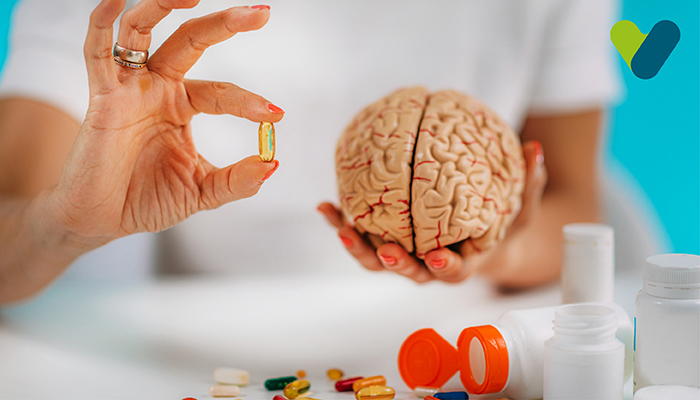Indians come third in line in terms of groups having the largest number of dementia patients; dementia in turn is a common symptom of Alzheimer's. About 45 to 50 lakh Indians are estimated to suffer from dementia and Alzheimer's although reporting is low. An estimated 5-6% of the 65+ year old population allegedly has Alzheimer's. These starling figures are eye-opening. If Alzheimer's affects 5 or 6 in every 100 individuals in India, you want to be sure that you are in the clear.
Let's find out what Alzheimer's is, what symptoms to look for, causes, testing and treatment options.
Basics first.
What is Alzheimer's
Here are some of the fundamental details about Alzheimer's that you should know and understand:- Alzheimer's is a disease that affects the brain.
- It typically affects seniors, or people above the age of 65 but there have been reports of early onset Alzheimer's affecting even people in their 40s.
- It is a degenerative disease. Brain cells and their connections get destroyed resulting in atrophy of the brain. This results in impairment of mental functions.
- Alzheimer's is not only degenerative but also progressive, in the sense that symptoms tend to get progressively worse.
- Social stigma associated with dementia that comes from Alzheimer's might result in low testing and reporting, putting patients at further risk because they forgo the treatment that could help control their symptoms.
- Alzheimer's is a matter of great debate and extensive research because even today there are limited answers on its causes and no cure exists although there are several clinical trials underway.
- Associations have been made between Alzheimer's and certain lifestyle habits, and other health conditions. We will discuss this in further detail when we talk about the causes of Alzheimer's.
Symptoms To Watch For
Because Alzheimer's affects and impairs mental function, symptoms begin to manifest slowly and gradually. Here are some telltale signs of a person heading for - or already suffering from - Alzheimer's.Forgetfulness/ Memory Loss
The individual might forget where they have placed items and might become irritated, paranoid and suspicious as a result. They might also forget events that happened very recently. Forgetfulness starts small and might come across as very normal (and could also be just that), so be mindful and watch for other signs without jumping to conclusions.Confusion Related To Time and Space
Disorientation related to dates, places and people is a more apparent sign of Alzheimer's but it might also show up only later. Any failure to recognise people frequently interacted with or inability to navigate a familiar place should be taken very seriously.Inability To Perform Simple, Familiar Tasks
Similarly, an inability to plan or understand/reason, a loss of the ability to practice restraint and not being able to do simple math that one uses on an everyday basis are common signs of Alzheimer's.One might also notice inability to learn new tasks.
Change in Mood And Behaviour
Irritability, anxiety, feeling overwhelmed, withdrawal from social interaction and loss of appetite are also commonly associated with Alzheimer's.There might also be lack of initiative (including towards personal hygiene), restlessness, and lack of focus, but these could also be confused with depression and as a result, family members or caregivers need to be vigilant to note the combination of symptoms that they can relate to a doctor.
Causes
As promised, let's look at the common associations between various lifestyle choices and health conditions:- People suffering from any, several or all of these health conditions have a higher chance of getting Alzheimer's: cholesterol, high blood pressure, diabetes and heart disease.
- Obesity and/or lack of exercise have been linked to Alzheimer's.
- Smoking has also been linked to a higher risk for Alzheimer's.
- Alzheimer's might also occur due to poor sleep habits
- Some studies have also pointed to long term exposure to paint as a possible cause for Alzheimer's
- Downs Syndrome
- Head injury
- Family history of Alzheimer's
Testing
For the most part medical professionals use a questionnaire to evaluate the presence of the symptoms we described above. The questions could be posed to both the patient and the family members or caregiver.Some might also confirm by a process of elimination, that is, they would utilise lab and imaging tests to rule out any other causes for cognitive impairment.
Neurological examination may also be used in some cases.
In recent times, a test that looks for "biomarkers" which indicate brain deterioration characteristic of Alzheimer's has been launched.
Treatment
Although there is no known cure for Alzheimer's, there are various methods employed for 3 things- Reducing risk
- Preventing progression
- Stimulating and protecting brain activity
- Physical fitness should be regular and consistent. You need to walk or exercise in any other way for at least 30 minutes, 5 days a week.
- Mental activity should be undertaken and encouraged on a daily basis. Turn to a crossword puzzle if nothing else.
- Memory triggers are important - look at old photos and videos, perform familiar tasks, try karaoke! "Don't forget" lists are also helpful.
- Quit smoking.
- Social interaction is an absolute must. If for any reason, the patient cannot interact or has noone to interact with, consider a support group.
- Cholinesterase inhibitors may be used as medical treatment under the supervision of a doctor.
- Some studies indicate that a Mediterranean diet might slow progression of symptoms but perhaps just a healthy diet that does not eliminate familiar Indian flavors can work too. Plan a healthy diet in collaboration with your medical professional.


